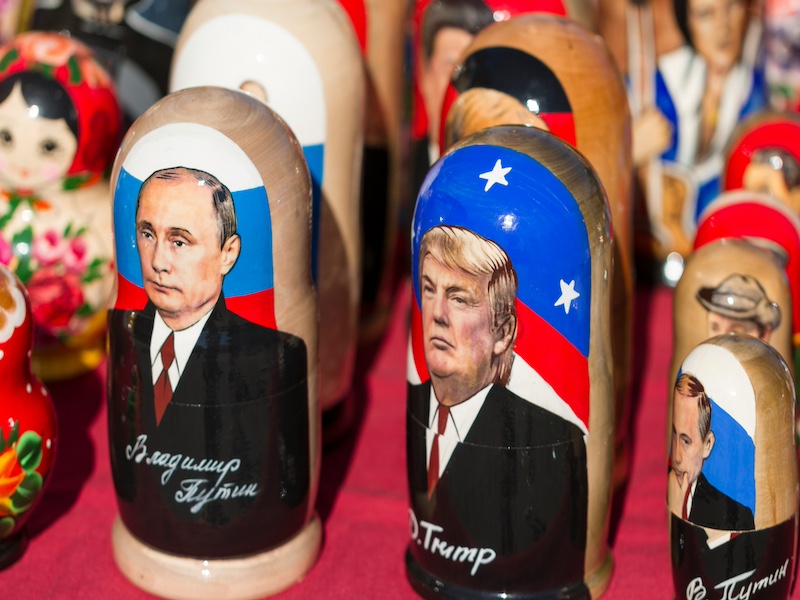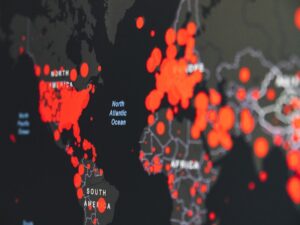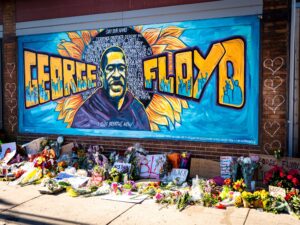Trump’s radical departure from convention is a betrayal of everything Republicans stand for. His underlying agenda may be a power play to make him president for life.
Trump has declared war on the world economy. Framed as a patriotic “declaration of independence,” his sweeping tariffs are marketed as a way to protect American jobs and reclaim control. Naturally, his loyal supporters have swallowed the message whole. But peel back the patriotic wrapping, and something far darker lurks beneath.
This isn’t about helping America. It’s about destabilising it.
If Trump’s endgame is to remain president indefinitely, then this may be more than a reckless policy. It might be part of the plan to create conditions ripe for an authoritarian power grab.
To become president for life, Trump would need to become a dictator — an idea he has openly flirted with. Many dismiss it as a joke. That’s part of the danger. He’s not joking.
It’s hard to forget how his last term ended: with the violent January 6th Capitol riots, which he incited. That failed coup revealed his intent. But the timing wasn’t right. America had the wrong conditions to justify such a radical shift.
What if Trump has spent the past four years thinking about how to create the right conditions?
History offers a clear answer: authoritarianism thrives when economies collapse, when fear spreads, and when people are desperate. That’s when “strongmen” rise — offering order, security, and revenge.
A tariff bomb
Even by Trump’s standards, he couldn’t have done much more in his first three months of office to create chaos. Trump has now implemented tariffs on more than 100 trading partners, including:
- 34% tariff on Chinese goods
- 20% tariff on the EU
- 24% tariff on Japan
In total, 60% of U.S imports will see an average 29.9% tariff increase. These aren’t minor tweaks. This is a full-scale assault on global trade.

A betrayal of Republican values
Trump has ripped up the economic rulebook that has come to dominate American policy over the last 40 years — ever since Ronald Reagan came to power.
That rulebook revolves around ‘neoliberalism.’ The foundation of neoliberalism is a belief in ‘market fundamentalism’ — the view that markets solve most, if not all, economic problems by themselves, without any government intervention.
Intervention in the form of increasing tax is the thing that neoliberals despise above all else. The Republicans embody neoliberalism. And they hate taxes. They argue that people should keep more of their own money.
Tariffs are taxes — plain and simple.
These tariffs will raise prices for Americans, hurt American businesses, and hammer consumers. It’s a full-blown betrayal of Reagan-era conservatism and the free-market orthodoxy Republicans have supported for decades.
Ripping up the rulebook
What makes this radical new policy direction so economically chaotic is that, globally, he’s torching the entire neoliberal playbook America has written.
That playbook revolves around the ‘Washington Consensus’, a term coined by the economist John Williamson in 1989. At the time, Williamson had made a list of ten policies that he thought more or less everyone in Washington would agree were needed in Latin America. Since then, these ten policies have become a cornerstone of globalisation.
In The Lexus and the Olive Tree, Thomas Friedman described the Washington Consensus as a ‘golden straitjacket’. Politically, the golden straitjacket “narrows the political and economic policy choices of those in power to relatively tight parameters.”
Those policy choices centre on free trade, deregulation, and fiscal discipline. Global capitalism demands countries specialise and trade. Through institutions like the World Trade Organisation and the International Monetary Fund, America enforced that system.

The argument for free trade rests on the principle of comparative advantage. This is the idea, popularised by David Ricardo in On the Principles of Political Economy and Taxation, that countries are better off exporting the things they are best at producing and importing the rest.
Comparative advantage has come to be accepted as an almost universal law of economics. That idea — for better or worse — underpins the modern world economy.
Now, Trump is abandoning comparative advantage and shattering the stability that underpins the global economy.
Laced with contradictions
Here’s where the Trump agenda gets so confusing. Trump has set up the Department of Government Efficiency to implement austerity measures that will see government spending shrink as he seeks to implement brutal cuts.
Just focusing on the actual policy itself, not the surrounding controversy, this very much complements the market fundamentalism that Trump is rejecting on the global stage.
That’s why Trump’s radical policy reforms are so confusing:
- foreign policy is defined by a rejection of the neoliberal rules that have come to define globalisation.
- domestic policy is focused on nailing those neoliberal rules to the table.
This contradiction is what makes his designs appear deceitful.
Economic Dominoes
Trump’s declaration of independence makes no sense. You can’t sever the cords from a hyper-connected global economy without dire consequences.
Everyone loses here. So what’s the endgame?
By disrupting global trade, Trump’s tariffs could see a wave of retaliatory tariffs — China has already struck back with a 34% tariff on U.S. imports. Markets have reacted as expected, with stock prices tumbling as nervous investors brace for the economic and political fallout.
Increasing tariffs will see prices increase for consumable goods. They also risk breaking global supply chains. This will see decreasing exports, which will dampen economic growth and could translate into a global recession.
Naturally, recession will amount to increasing civil unrest as the cost-of-living crisis gets even worse. Recession will see job losses and people falling into poverty.
And the people that are set to be hit hardest? Everyday Americans. But maybe that’s the point. Maybe chaos is the plan.
This is before we get started on the diplomatic impacts between nations. In starting a war on the world economy, Trump may be hoping to incite an actual war.
Chaos…perfect.
The political endgame
Throughout history, economic turmoil and military conflict have repeatedly served as launchpads for authoritarian power grabs. When societies are in chaos — when jobs vanish, inflation soars, or enemies, actual or perceived, threaten national security — people often seek stability over freedom.
Extreme problems call for extreme solutions. That’s when opportunistic, extremist leaders strike with a high success rate.
Adolf Hitler — Germany was already struggling to recover economically from the First World War due to the terms of their surrender. This post-war struggle was intensified by the Great Depression, which led to hyper-inflation and rampant poverty.
People were desperate for solutions.
Adolf Hitler exploited this despair, blaming scapegoats, demonising political rivals, and promising to restore national pride. Once in power, he used the 1933 Reichstag Fire to declare a national emergency, suspending civil liberties and consolidating total control under the Nazi regime.
Benito Mussolini — Italy’s post–first world war collapse — marked by hyperinflation, mass strikes, and fear of communist revolution — paved the way for Benito Mussolini. He marched on Rome in 1922, not through military conquest but by leveraging fear and dysfunction.
King Victor Emmanuel III appointed him Prime Minister to avoid civil war. Within years, Mussolini had dismantled democratic institutions and established fascist rule.

Vladimir Putin — In Russia, Vladimir Putin rose to power amid a war in Chechnya and a string of deadly apartment bombings in 1999. While the origin of the attacks remains controversial, the public fear they provoked helped Putin justify crackdowns and expanded surveillance. Later, economic sanctions and domestic unrest were used to justify tighter control and extend his reign beyond constitutional limits.
The endgame
History reveals a consistent pattern where crisis becomes the pretext, not the obstacle, to authoritarianism. Whether manufactured, exaggerated, or simply exploited, economic collapse and national emergencies offer the perfect backdrop for leaders who seek to dominate.
With the backdrop of history in mind, tariffs may be just the beginning of a set of economic dominoes designed to destabilise the world economy and instigate chaos, both domestically and on the world stage.
If a recession sets in…
If protests ignite…
If violence flares…
Trump could declare a national emergency, suspend elections, or claim that only he can restore order. In making such a claim, he could argue for the need to extend his term ‘temporarily’ as a matter of national security. From there, it becomes much easier for him to manoeuvre to remain in power indefinitely.
It is in moments of political, economic and social chaos that unthinkable ideas become far more appealing. A Trump dictatorship is one of those.
To believe Trump will quietly bow out after four more years is to underestimate someone who has already shown he will incite insurrection to cling to power. His trade war isn’t for America’s benefit — it’s a power play. He’s setting the stage for chaos that he will claim he alone can solve. That’s not leadership. It’s sabotage with a crown in mind.
Think this sounds extreme? That’s always what people think before dictators rise to power. If we want to stop history from repeating itself, we need to see the warning signs now.



